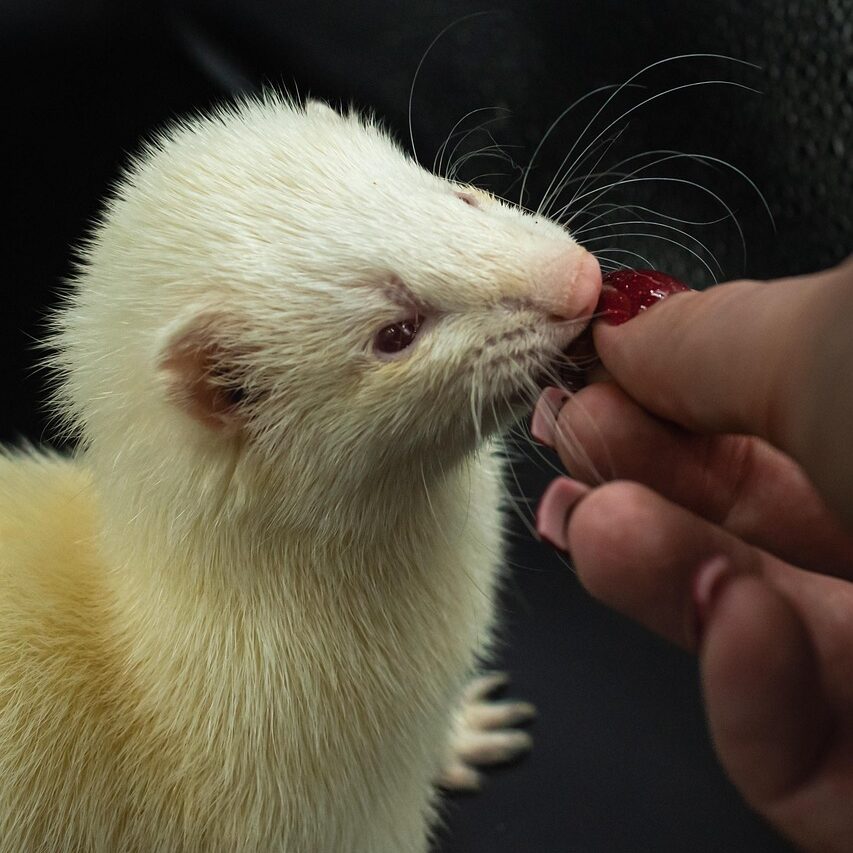What Do Ferrets Eat? Complete Nutrition Guide
Introduction
Ferrets are adorable, energetic, and highly curious pets, but their dietary needs require proper ferret nutrition to keep them healthy and active. As obligate carnivores, ferrets require a diet rich in animal proteins and fats to stay healthy. Feeding them the wrong foods can lead to serious health problems, including digestive issues, malnutrition, and even life-threatening conditions.
In this complete ferret nutrition guide, we’ll explore what ferrets should and shouldn’t eat, the best commercial and homemade food options, feeding schedules, and essential vitamins and nutrients for their overall well-being. By the end of this article, you’ll have a solid understanding of how to provide a balanced diet that supports your ferret’s health and longevity.
Understanding a Ferret’s Natural Diet
Obligate Carnivores: What Does It Mean?
Ferrets are obligate carnivores, which means they rely entirely on animal-based proteins and fats to survive. Unlike omnivores, which can digest both plant and animal matter, ferrets lack the necessary enzymes to break down carbohydrates, fiber, and plant-based proteins efficiently.
How Wild Ferrets Eat
In the wild, ferrets (and their relatives like polecats) hunt small prey such as:
- Mice
- Rabbits
- Birds
- Insects
They consume the entire animal, including bones, organs, and muscle meat, which provides them with a naturally balanced diet. Replicating this as closely as possible in captivity ensures a healthy pet.
Essential Nutrients for a Ferret’s Diet
1. Protein: The Building Block of Ferret Nutrition
Ferrets require a diet with at least 35-40% high-quality animal protein. Good sources of protein include:
- Chicken
- Turkey
- Rabbit
- Beef
- Lamb
- Fish (in moderation)
2. Fat: A Key Energy Source in Ferret Nutrition
Ferrets need a diet with around 20-30% fat for energy. Healthy fat sources include:
- Chicken fat
- Fish oil
- Egg yolks
3. Taurine: Essential for Ferret Nutrition
Taurine is an amino acid crucial for a ferret’s heart and eye health. It’s naturally found in:
- Raw meats (especially poultry and organ meats)
- Fish
- Eggs
4. Vitamins and Minerals in Ferret Nutrition
Ferrets need various vitamins and minerals to maintain a strong immune system and overall health. These include:
- Vitamin A (found in liver and eggs)
- B vitamins (found in meat and organs)
- Vitamin D (from sunlight or fatty fish)
- Calcium and phosphorus (from bones and animal tissue)
Best Commercial Food for Ferret Nutrition
1. High-Quality Ferret Kibble
If raw feeding isn’t an option, a high-quality ferret kibble is a convenient alternative. Look for brands that contain:
- 35-40% protein
- 20-30% fat
- Low or no carbohydrates
Avoid brands with:
- Corn, wheat, or soy
- Artificial preservatives and fillers
2. Raw and Freeze-Dried Diets for Ferret Nutrition
Many ferret owners prefer a raw or freeze-dried diet because it closely mimics what ferrets eat in the wild. These diets often include whole prey options such as:
- Whole chicks
- Mice
- Rabbit pieces
Freeze-dried raw food can be a great alternative for those who prefer the benefits of raw feeding but want a shelf-stable option.
Homemade Diet for Ferret Nutrition
1. Whole Prey Model
A whole prey diet includes small animals such as:
- Mice
- Quail
- Rats
This provides a natural balance of nutrients, just as they would get in the wild.
2. Raw Meat and Organ Mix for Ferret Nutrition
If whole prey isn’t an option, a homemade raw diet should include:
- 80% muscle meat
- 10% bones
- 10% organs (liver, heart, kidneys)
A good recipe example:
- 500g chicken thighs
- 100g chicken liver
- 50g chicken hearts
- 1 crushed eggshell for calcium
Foods to Avoid in Ferret Nutrition
Toxic and Harmful Foods for Ferrets
Certain foods are dangerous for ferrets and should never be fed, including:
- Fruits and vegetables (too high in fiber and carbs)
- Dairy products (ferrets are lactose intolerant)
- Grains and starches (corn, wheat, rice)
- Chocolate and sweets (toxic and can cause insulinoma)
- Dog food (lacks essential nutrients for ferrets)
Feeding Schedule and Portion Control
How Often Should Ferrets Eat?
Ferrets have a fast metabolism and should eat 4-6 small meals per day. Free-feeding kibble is an option, but raw diets should be served fresh.
Portion Size Guidelines
- Kibble-fed ferrets: 1/4 to 1/2 cup per day
- Raw-fed ferrets: 2-4 ounces of meat daily
Hydration: The Importance of Fresh Water
Ferrets need constant access to fresh, clean water. Use a:
- Water bowl (preferred, as it mimics natural drinking habits)
- Water bottle (can be used but may not be as comfortable for drinking)
Conclusion
Feeding your ferret the right diet is essential for their health, energy levels, and longevity. As obligate carnivores, they thrive on a high-protein, high-fat diet with minimal carbohydrates. Whether you choose a high-quality kibble, raw feeding, or a whole prey diet, ensuring the right balance of nutrients is key. Avoid harmful foods like fruits, vegetables, dairy, and grains, and provide plenty of fresh water. By following this complete nutrition guide, you’ll keep your ferret happy, active, and healthy for years to come.
Frequently Asked Questions (FAQs)
1. Can ferrets eat eggs?
Yes! Eggs are a great source of protein and fat. You can feed them raw or cooked, but limit to 1-2 eggs per week to prevent digestive issues.
2. Can ferrets eat cat food?
High-protein, grain-free kitten food can be a temporary alternative, but it’s not ideal for long-term nutrition. Ferret-specific food or a raw diet is best.
3. How long can ferrets go without food?
Ferrets should never go more than 4-6 hours without food, as their metabolism is extremely fast. Lack of food can cause low blood sugar and serious health problems.
4. Do ferrets need supplements?
If feeding a balanced raw or high-quality kibble diet, supplements are usually unnecessary. However, taurine supplements may be beneficial if the diet lacks organ meats.
5. What is the best protein source for ferrets?
Chicken, turkey, rabbit, and beef are among the best protein sources for ferrets. Always opt for fresh, high-quality meats free from seasoning or additives.
By following this guide, you’ll ensure that your ferret receives the best possible nutrition for a long and healthy life!





